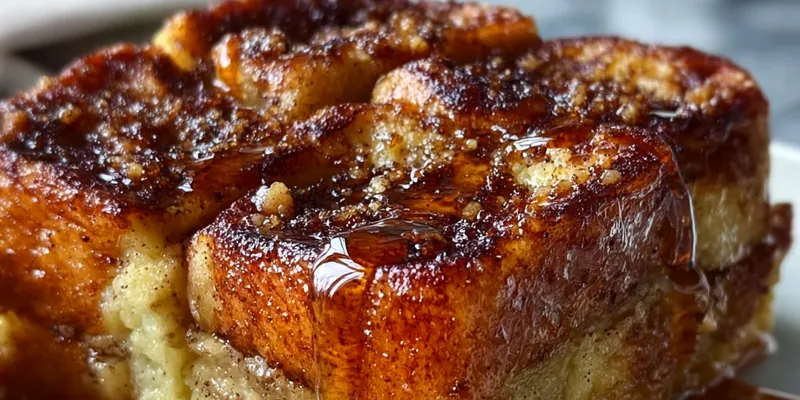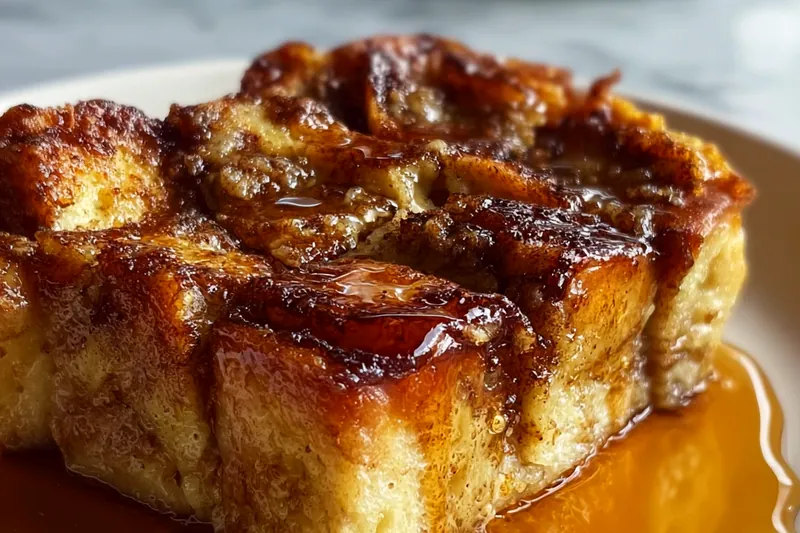French Toast Casserole Serving
Rich and custardy French toast casserole that's perfect for feeding a crowd. Make-ahead breakfast with crispy top and tender interior, ideal for holidays and brunches.

The Art of Perfect French Toast Casserole
The secret to exceptional French toast casserole lies in the custard-to-bread ratio and proper soaking time. The bread should absorb the custard mixture completely while maintaining enough structure to create distinct layers. Using day-old bread or letting fresh bread dry slightly prevents mushiness.
Temperature control during baking ensures a golden top while maintaining a creamy, set interior. The casserole is done when a knife inserted in the center comes out with just a few moist crumbs, similar to testing a custard or bread pudding.
💡 Professional Tip
Let the assembled casserole rest at room temperature for 30 minutes before baking. This prevents thermal shock and ensures even cooking throughout, resulting in a perfectly set center and golden top.
Frequently Asked Questions
Absolutely! In fact, it's better when made ahead. Assemble completely, cover, and refrigerate overnight. The bread absorbs more custard, creating a richer texture. Just add the topping before baking.
Brioche or challah work best due to their rich, eggy texture and ability to absorb custard. French bread or thick Texas toast are good alternatives. Avoid thin sandwich bread as it becomes too soggy.
The center should be set but still slightly jiggly, and a knife inserted comes out with minimal custard. The top should be golden brown and slightly crispy. Internal temperature should reach 160°F.
Yes, you can freeze the unbaked assembled casserole for up to 1 month. Thaw overnight in refrigerator before baking. Cooked casserole can be frozen for up to 2 months.
Use slightly stale bread, don't oversoak, and bake on the lower oven rack for the first 20 minutes. A glass or ceramic baking dish conducts heat better than metal for even cooking.
Yes! Divide mixture among 8 ramekins or muffin cups. Reduce baking time to 25-30 minutes. Perfect for portion control or elegant presentation at brunches.
You can substitute with all milk (use 2¾ cups total) or half-and-half. Heavy cream creates the richest texture, but the casserole will still be delicious with alternatives.
Refrigerate leftovers for up to 4 days. Reheat portions in the microwave or oven at 350°F until warmed through. The texture is best within the first 2 days.
Recipe Troubleshooting Guide
Soggy Texture
Problem: Casserole turns out too wet and soggy
Solution: Use day-old bread, reduce milk slightly, and bake until center is properly set. Don't oversoak the bread initially.
Dry Casserole
Problem: French toast casserole is dry and tough
Solution: Increase soaking time, add more custard mixture, and don't overbake. Cover with foil if top browns too quickly.
Uneven Cooking
Problem: Edges cook faster than center
Prevention: Use a glass baking dish, tent edges with foil if needed, and ensure even distribution of bread and custard mixture.
Burnt Top
Problem: Topping burns before center is cooked
Recovery: Cover with foil after 30 minutes, lower oven temperature to 325°F, and bake longer. Add topping halfway through baking instead.
Custard Separating
Problem: Custard mixture curdles or separates
Prevention: Don't overheat eggs when mixing, use room temperature ingredients, and strain custard if lumpy. Whisk thoroughly but gently.
Flavor Balance Issues
Too Sweet: Add a pinch of salt or reduce maple syrup slightly
Too Salty: Increase vanilla extract or add extra maple syrup when serving
Bland: Increase vanilla, cinnamon, or add a touch of almond extract to custard base

Selecting Quality Ingredients for Best Results
The foundation of great French toast casserole starts with quality bread. Brioche and challah contain eggs and butter, making them naturally rich and perfect for absorbing custard without falling apart. Their slightly sweet flavor complements the spiced custard beautifully.
Fresh eggs and quality dairy create the silky custard that transforms simple bread into an indulgent breakfast. The combination of milk and cream provides richness while maintaining the proper consistency for even absorption throughout the bread.
Essential Ingredient Notes
- Bread Selection: Choose thick-cut brioche or challah for best texture. If unavailable, use thick French bread or Texas toast. Slightly stale bread actually works better than very fresh.
- Egg Quality: Use large, fresh eggs for the richest custard. Room temperature eggs mix more easily and create a smoother custard base without lumps.
- Maple Syrup: Pure maple syrup adds complex sweetness that can't be replicated with artificial syrup. Grade A Dark Robust provides the deepest flavor for baking.

Mastering the Make-Ahead Method
The overnight soaking process is what transforms ordinary French toast casserole into something extraordinary. During this time, the bread fully absorbs the custard while flavors meld and intensify. This patient approach results in even cooking and superior texture.
Proper baking technique ensures a golden, slightly crispy top while maintaining a creamy interior. The casserole should puff slightly and be set in the center when done. Resting after baking allows the custard to finish setting for clean slicing.
The Perfect Soak
Gently press bread cubes into custard mixture to ensure even absorption. The bread should be completely saturated but not disintegrating. Longer soaking times create richer flavor and better texture.
French Toast Casserole Serving
📋 Ingredients
For the Casserole Base
- 100g brown sugar for toppingCreates caramelized crunch
- 60g chopped pecansAdds texture and nutty flavor
- 30g cold butter, cubedFor crumbly topping texture
- 1 tsp cinnamon for toppingWarm spice for finishing
- Maple syrup for servingEssential finishing touch
- Powdered sugar for dustingBeautiful presentation element
For the Crumb Topping
- 10 thick slices brioche or challah breadFoundation for rich texture
- 8 large eggsCreates rich custard base
- 500ml whole milkProvides creamy texture
- 120ml heavy creamAdds luxurious richness
- 80g brown sugarSweetens and adds molasses notes
- 60ml maple syrupComplex sweetness and flavor
- 2 tsp vanilla extractEssential flavor enhancement
Instructions
Prepare Bread
Grease a 9x13 inch baking dish. Cut bread into 1-inch cubes and arrange evenly in the prepared dish. Let bread sit out for 30 minutes to dry slightly if very fresh.
Make Custard Base
In a large bowl, whisk together eggs, milk, cream, brown sugar, maple syrup, vanilla, cinnamon, nutmeg, and salt until well combined and smooth.
Assemble Casserole
Pour custard mixture evenly over bread cubes. Press bread down gently to ensure all pieces are soaked. Cover and refrigerate for at least 4 hours or overnight.
Prepare Topping
Preheat oven to 350°F (175°C). In a small bowl, combine brown sugar, pecans, and cinnamon. Add cold butter cubes and mix with fingers until crumbly.
Bake Casserole
Remove casserole from refrigerator 30 minutes before baking. Drizzle with melted butter and sprinkle topping evenly over surface. Bake for 45-50 minutes until golden brown and set in center.
Rest and Serve
Let cool for 10 minutes before serving. Dust with powdered sugar and serve with warm maple syrup. Cut into squares and serve warm.
Recipe Notes & Tips
Make-Ahead Tips
This casserole is perfect for overnight preparation. Assemble completely the night before, cover tightly, and refrigerate. Just add the topping and bake in the morning.
Serving Suggestions
Serve with fresh berries, whipped cream, or a drizzle of warm maple syrup. For special occasions, add a dollop of mascarpone or crème fraîche.
Storage and Reheating
Leftover casserole keeps in the refrigerator for up to 4 days. Reheat individual portions in the microwave or warm the whole dish covered in a 350°F oven until heated through.
